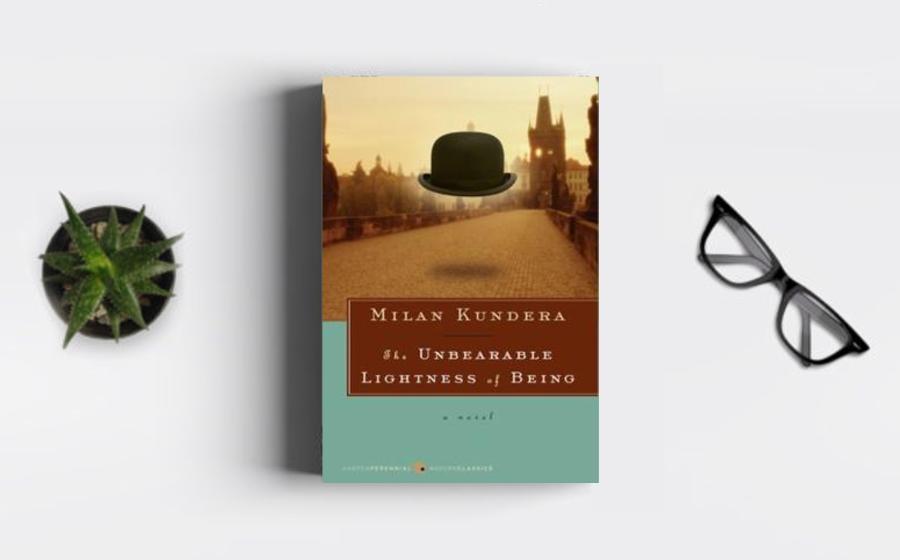"The Unbearable Lightness of Being" transcends the
boundaries of conventional storytelling, offering
readers a profound exploration of love, existence, and
the relentless pursuit of meaning in the face of life's
fleeting nature. Published in 1984, this philosophical
novel has etched its place among the top books of all
time, captivating audiences with its intellectual depth,
rich characterizations, and existential musings. In this
review, we unravel the intricacies of Kundera's
masterwork and delve into why it continues to resonate
across generations.
At the heart of
"The Unbearable Lightness of Being" lies the
philosophical concept of eternal recurrence. Kundera
introduces the idea that life is lived only once, making
every choice, every action, an irreparable and
unrepeatable event. This notion stands in contrast to
Friedrich Nietzsche's theory of eternal return, where
every moment is destined to recur infinitely.
The
characters grapple with the weight of their choices in a
world where nothing is fated to repeat. Tomas, the
protagonist, embodies the pursuit of lightness, choosing
to embrace each moment without the burden of eternal
consequences. Tereza, on the other hand, seeks the
comfort of weight, desiring the solidity of eternal
recurrence that imparts significance to life.
Kundera invites readers to reflect on the nature of
existence and the implications of living in a world
where the choices we make are not bound by destiny. The
novel becomes a philosophical tapestry that weaves
together the threads of freedom, responsibility, and the
inherent paradox of lightness and weight.
Set against the backdrop of Czechoslovakia during
the Prague Spring of 1968, "The Unbearable Lightness of
Being" explores the complexities of love and sexuality
in a time of ideological turmoil. The characters
navigate a landscape where personal relationships are
entangled with political upheaval, and intimacy becomes
a form of rebellion against oppressive regimes.
Tomas, a successful surgeon and unapologetic womanizer,
grapples with the tension between love and the pursuit
of physical pleasure. His romantic entanglements with
Tereza, a young and idealistic woman, and Sabina, a
free-spirited artist, highlight the multifaceted nature
of love and desire.
The novel provocatively
challenges societal norms surrounding love and
sexuality, presenting characters who resist conformity
and explore the boundaries of intimacy. Kundera's
portrayal of human relationships becomes a lens through
which he examines the impact of political ideologies on
the personal and the erotic.
Kundera
employs a unique narrative structure that weaves
together multiple perspectives, creating a tapestry of
interconnected lives. The novel is not bound by a linear
timeline, and events unfold through a series of episodes
that provide glimpses into the characters' pasts,
presents, and futures.
The narrative structure
reflects the novel's thematic exploration of eternal
recurrence, allowing readers to witness the characters'
lives from various vantage points. Kundera's use of
shifting perspectives adds depth to the storytelling,
creating a nuanced portrait of each character's inner
world.
Through the non-linear narrative, Kundera
invites readers to engage actively with the text,
piecing together the characters' experiences and
choices. This interactive storytelling approach aligns
with the novel's philosophical undertones, encouraging
readers to contemplate the implications of the
characters' existential dilemmas.
"The Unbearable Lightness of Being" is not merely a
novel; it is a platform for philosophical reflection on
a myriad of themes. Kundera seamlessly integrates
meditations on art, politics, identity, and the human
condition into the fabric of the narrative.
Sabina's identity as an artist and her reflections on
the concept of kitsch become a lens through which
Kundera critiques the commodification of culture and the
distortion of artistic expression. The novel engages
with questions of authenticity and the role of art in a
world dominated by ideological constraints.
Political commentary permeates the novel, with Kundera
offering insights into the impact of totalitarian
regimes on individual lives. The characters grapple with
the tension between personal freedom and political
conformity, navigating a world where every choice is
laden with political significance.
Kundera's prose in
"The Unbearable Lightness of Being" is a symphony of
linguistic elegance. His writing is characterized by its
lyrical quality, intellectual precision, and the ability
to convey complex ideas with clarity. Each sentence is
crafted with meticulous care, contributing to the
novel's aesthetic beauty.
The author's command of
language enhances the reader's immersion in the
philosophical explorations, making abstract concepts
tangible through the evocative power of words. Kundera's
prose invites readers to savor the beauty of language
while grappling with profound existential questions.
In 1988, Philip Kaufman directed the
film adaptation of "The Unbearable Lightness of Being,"
bringing Kundera's novel to the visual realm. The film,
like the novel, received critical acclaim for its visual
storytelling, evocative cinematography, and powerful
performances.
The cinematic adaptation adds
another layer to the novel's enduring legacy, showcasing
the adaptability of its themes and characters across
different artistic mediums. The visual interpretation
further solidifies the novel's status as a work with
cross-media resonance.
"The Unbearable Lightness of Being" stands as a testament to the enduring power of literature to provoke thought, challenge conventions, and explore the complexities of the human experience. Through its philosophical depth and linguistic elegance, the novel has rightfully earned its place among the top books of all time.






